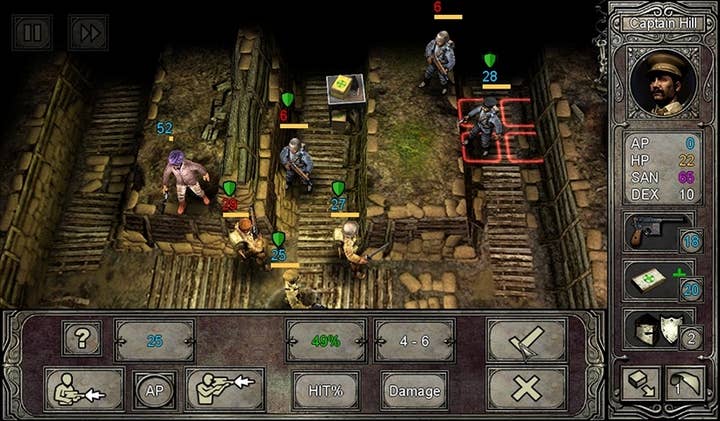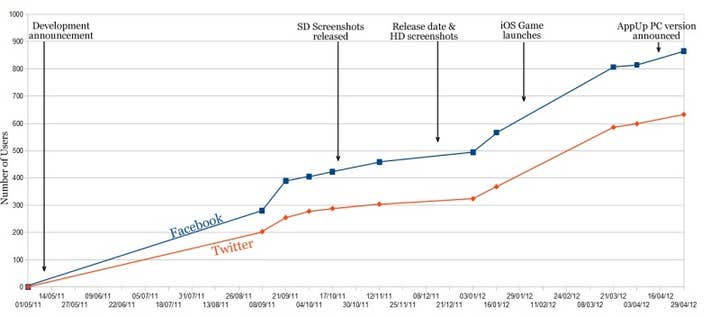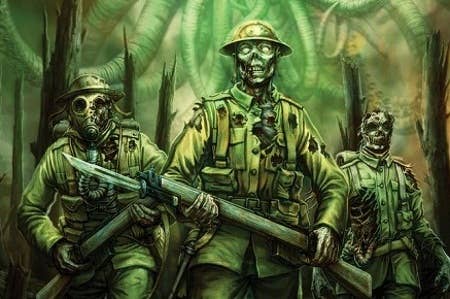From Paper to Digital: The Cthulhu Strategy of Games Development
How Red Wasp Design brought Chaosium's much-loved RPG to life with a small budget, good-will and just £1000 of marketing money
Red Wasp Design is a small indie developer founded by a group of industry veterans. In that respect I suspect we are like many of the other recent start-ups, nothing special so far. We've put our first game out, Call of Cthulhu: The Wasted Land. It's done pretty well on iOS. It charted at number 1 in the Role Playing Game category in the AppStore and the reviews have been positive ("I was totally addicted to this game for weeks..." Wired.com, "The best strategy game on the iPad yet." DigitallyDownloaded.net, 5/5 from T3 Magazine for example). Also by the time you read this article the PC version will be out on Intel's AppUp center. So far, so good. However, while we've done well, we've still got a distance to go, and with that in mind we wanted to share our strategy for Red Wasp Design with you and see how it chimes with your own experience.
"The £3 price had the effect of putting off casual gamers, which meant less sales but also less bad reviews, as to buy it you had to be committed"
Scroll back 18 months(ish) and we are in the discussion stages of what would become Red Wasp Design. Of course we saw the runaway success of Angry Birds and the like, but also knew how many titles Rovio had to release before it got its mega-hit. We knew that around 75 per cent of iPhone games make less that £18,000 (and within that 25 per cent make less than £120). We knew this was a huge gamble, that each release is a roll of the dice and the odds are against us. The question we pondered was how to improve those terrible odds. The first thing we knew we could do is make a really high quality game. We've been making games for a long time and by pouring that skill and experience into our new title we hoped it would stand out by the quality. That was a good start to our strategy but not enough by itself.
The Crowded AppStore
What became one of the main threads to our evolving strategy was getting noticed. This became a key part to make Red Wasp Design something we could be proud of. With an estimated 300 apps per day being released and just over 100 of those being games, the AppStore is a very crowded place, so we developed a strategy to find an intellectual property holder we could partner with, that had recognition but that wasn't overdone. It was also key to find something we liked, nothing sucks more than people making games based on IPs they don't like. The other thing that was key was where the creative control in this would lie. In past companies we've all worked on major IPs, and the balance of power tends to live with the IP holder. We took the decision to seek use of the IP without any corresponding funding from the IP holder. The deal was about offering a share of the profit of the game in exchange for the use of the IP and help with publicity. That way we'd have the creative control we wanted and yet an IP that would allow us to stand out from the crowd of the 99 other games that would also launch on our release date. From the IP holders perspective they are risking us making a terrible game that reflects badly on their IP, but not any cash. However by cooperating from an early stage (as we did) the risks to the IP can be minimised.
Why Cthulhu?

So enter stage left, Cthulhu! If you are new to Cthulhu, he (it?) is the titular monster of 'The Call of Cthulhu', originally a novella by cult horror writer H.P. Lovecraft which has, since it was published in 1928, captured the imagination of generation after generation of fans. There have been a number of films and other works adapted from his fiction and Cthulhu has become a meme within popular culture from being in South Park, to a song by Metallica to having a spider named after him (Pimoa cthulhu). Critically for us, his works also inspired a best selling role-playing game, Call of Cthulhu, which celebrated its 30th anniversary in 2011. Over the years, as well as gathering many dedicated players it has won numerous awards, from the Game Designer's Guild Select Award in 1981 to being voted as the number 1 Gothic/Horror RPG by readers of GamingReport.com in 2003.
The suggestion to work with Chaosium's IP (the publishers of the Call of Cthulhu RPG) had its roots with myself and Stuart (our artist) doing a paper RPG monograph for them a few years ago, called 'The Dark Mirror'. After this project was completed I'd chatted to them about doing something digital. For various reasons nothing happened back then but as we planned Red Wasp Design it occurred to me that this might be an excellent IP to work with; it was well known, especially by gamers and there had not been any iOS game nor any other title for a few years (since the excellent Dark Corners of the Earth). This has worked well for us and Chaosium have been great to work with; extensive knowledge of the IP where you need it, but trusting the video game responsibility to us. Crucially also supporting the release of the game with their site, Twitter and email presence.
Did the Cthulhu Strategy Work?

So the promotion of the game began with that initial press release, which carried currency because of the IP of Chaosium far more than it would have with us just being a new studio. We talked to Cthulhu/Lovecraft fan sites and built a relationship with them, which helps because I too am a fan, but also because we're working with Chaosium. This outreach was ongoing from the very early days, not something as a games designer I'd originally envisioned doing, but each week I'd spend time building up our social media fan base and relations with blogs and sites. Facebook is our most important outlet with Twitter a close second, but what you can see from the graph [left] of our numbers over time is that there was no sudden burst, more a steady building of presence.
The combined effect of this and our work with games media outlets was to ensure that by the time the iOS launch came along we'd got a buzz going. Note our marketing budget was £1000; so what we did had to count (that's roughly 500 games we'd have to sell to break even on just that spend). Upon release we opted for a high price-point (£3 but only relative to iOS - I still think £3 is a tiny amount to pay for a game, as for 69p... a total bargain in most cases) which we felt would be justified by the quality of the game and the IP. It also had the effect of putting off casual gamers, which meant less sales but also less bad reviews, as to buy it you had to be committed. This is key as Call of Cthulhu: The Wasted Land is a geeky game, a mix of the X-Com classics of yesteryear and the Call of Cthulhu paper RPG system. The existing IP awareness meant we got a lot of coverage upon release and so it sold well (charted at no.1 RPG on iPhone UK charts for example) and continues to sell well. But it has a lot of ground to cover and iOS was only ever intended to be our beachhead...
Breaking Out of R'lyeh!
As we'd noted, the game is no Angry Birds and never will be. So the second part of the strategy was to be multi-platform. While iOS is an accessible and democratised first platform, we felt that long term to make the project work, we needed to aim to be on several platforms so the development was done in a modular way right from the start. This meant that assets could be re-purposed for other platforms faster than building each from scratch therefore the initial game took longer to make but also kept the quality high, key to the pricing and IP strategy (we love it when a plan comes together). As well as the development, we also needed release platforms and some specialist work we could not do in-house such as translations. Fortunately we talked to Intel and they liked what we were doing (and the reviews we'd had) so they offered to support us with translation and PC porting costs if we'd debut on AppUp.
"Active outreach, posting ideas onto our blog, chatting with fans, taking time and care with the IP - all have paid off. When we had some bugs on the iOS version we weren't hammered in the same way as other games"
By the time you read this the PC version will be out. We've got some DLC underway and the Android version almost done too. At the core of this frenzy of development is the IP - Call of Cthulhu. We never lose sight of the fact that we are adapting a much loved RPG. That is a huge challenge and if we ever get it wrong the very fans we hope will help push the game would squash it (and rightly so). So active outreach, posting ideas onto our blog, chatting with fans, taking time and care with the IP - all have paid off with great fan support - so much so that when we had some bugs on iOS version 1.1 we weren't hammered in the same way as other games have but our fellow gamers had patience and worked with us in helping report bugs so we could fix them. As they say in the Mythos, "Ph'nglui mglw'nafh Cthulhu R'lyeh wgah'nagl fhtagn."
